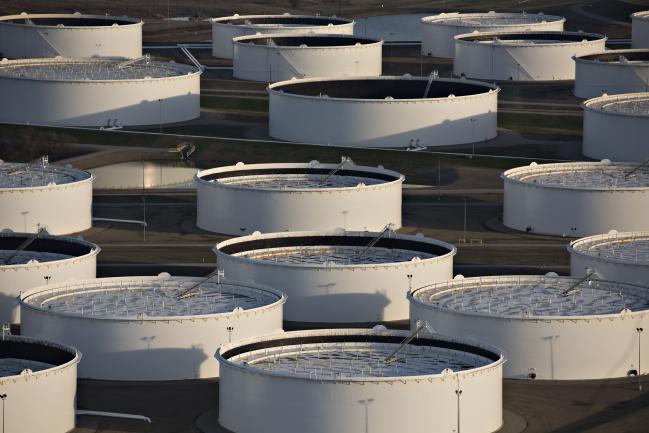 © Bloomberg. Oil storage tanks stand in this aerial photograph taken above Cushing, Oklahoma, U.S.
© Bloomberg. Oil storage tanks stand in this aerial photograph taken above Cushing, Oklahoma, U.S.(Bloomberg) — Crude closed at its lowest in almost two weeks as Russia is said to be less than convinced that OPEC should extend output curbs in a meeting this month.
The U.S. benchmark slipped 0.7 percent on Wednesday as Russia believes it’s too early to announce a possible extension at OPEC’s meeting at the end of the month, according to two people with knowledge of the matter. The limits, sealed in a deal between OPEC and other producers in 2016, are scheduled to end in March. Meanwhile, U.S. government data showed that production climbed to a fresh record.
“It sounds like there is some discourse between OPEC and non-OPEC in terms of not committing to something at the end of the month, and maybe kicking the can down the road,” said Nick Holmes, an analyst at Tortoise Capital Advisors LLC in Leawood, Kansas, which manages $16 billion in energy-related assets.
Oil rallied above $57 a barrel to a two-year high last week on escalating tensions in the Middle East and amid signals of a potential extension of supply curbs by the Organization of Petroleum Exporting Countries and allies. Since then, futures have slid about 3.5 percent.
OPEC has yet to show it has convinced Russia, one of its partners in the deal, that a decision to prolong output cuts is needed when the group meets in Vienna later this month. Another issue is how long any extension should be, with options including an added three months being considered.
Price Weakness
The Russian government has yet to reach a consensus with the nation’s oil companies on extending the deal, according to the people familiar with the discussions.
“We expect prices to remain soft and move related to any rhetoric that comes out prior to those meetings from all of the involved parties,” Adam Wise, who oversees an $8 billion energy portfolio at John Hancock Financial Services Inc. in Boston, said by telephone. “You’ve certainly seen Russia’s comments weighing on the market.”
West Texas Intermediate for December delivery fell 37 cents to settle at $55.33 a barrel on the New York Mercantile Exchange, the lowest close since Nov. 2. Total volume traded was about 11 percent below the 100-day average. December options contracts expire Wednesday.
for January settlement dropped 34 cents to end the session at $61.87 a barrel on the London-based ICE Futures Europe exchange. The global benchmark was at a premium of $6.35 to January WTI.
American crude stockpiles climbed by 1.85 million barrels last week to 459 million barrels, and production extended gains to an all-time high 9.65 million barrels a day, the Energy Information Administration said Wednesday. The inventories build came in smaller than the 6.51 million-barrel rise that the American Petroleum Institute was said to report Tuesday.
Crude exports rose by 260,000 barrels a day, while inventories at the key Cushing, Oklahoma, pipeline hub fell by 1.5 million barrels, the largest draw since July. Distillate stocks were at the lowest since February 2015.
Oil-market news:
- Shale drillers are promising to add a new wrinkle to their world-shaking oil boom: they may finally make money.
- China and India are each targeting a share of Abu Dhabi’s largest offshore oil fields as the Persian Gulf producer seeks partners to boost output and ensure exports of its oil to two of the world’s most promising markets.
- Oil trader Vitol Group and private equity firm Carlyle Group (NASDAQ:) mandated banks to prepare an initial public offering for Varo Energy BV that could value the European refiner and service station operator at about 2 billion euros ($2.37 billion), according to people familiar with the matter.
Fusion Media or anyone involved with Fusion Media will not accept any liability for loss or damage as a result of reliance on the information including data, quotes, charts and buy/sell signals contained within this website. Please be fully informed regarding the risks and costs associated with trading the financial markets, it is one of the riskiest investment forms possible.
Source: Investing.com




























